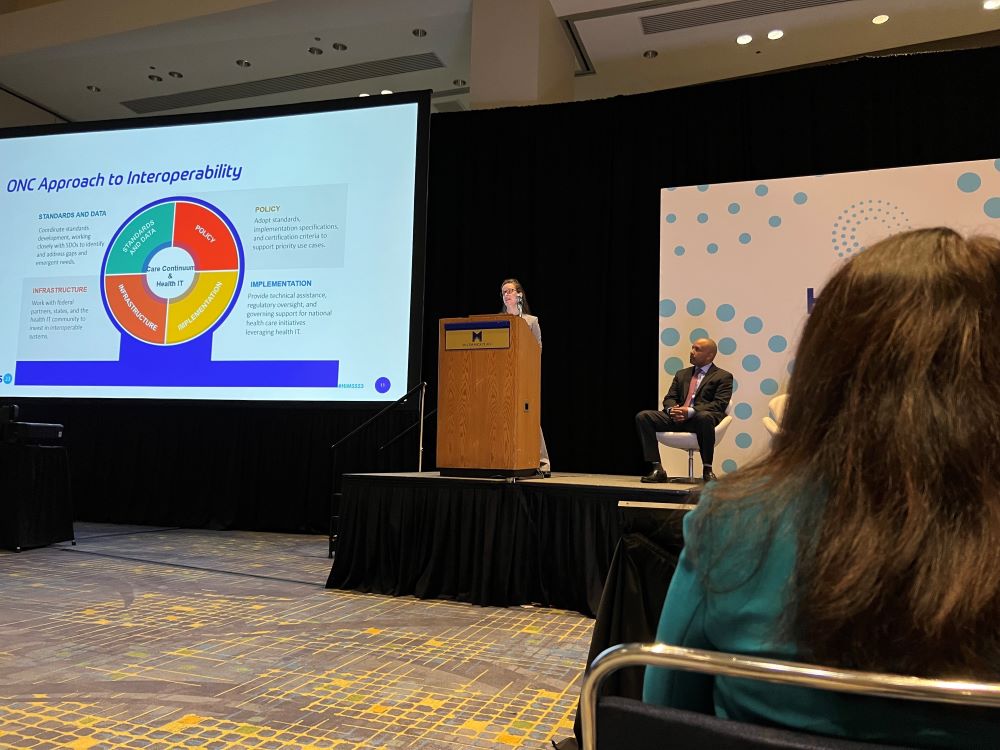Leveraging Tech, Data to Create ‘Health Equity by Design’
Leaders from ONC discuss how the concept is using data standards to ensure data privacy and equity in health care.

The Office of the National Coordinator for Health IT (ONC) is developing a new concept, called “health equity by design,” to use and collect data in order to better identify health inequities and create mechanisms to mitigate health inequities.
“It’s making sure that health equity is a forethought, not an afterthought, as we implement, design and build technology solutions — in the same way that there’s privacy by design and security by design — that it’s essential that we think about health equity by design when it comes to information technology systems,” ONC Chief Medical Officer Tom Mason said at the HIMSS Conference in Chicago Thursday.
ONC is focusing a part of the concept on identifying, gathering and structuring data to better identify where inequities exist and develop upstream interventions. A task force at the agency identified key concepts and priority areas for implementing health equity by design, including data collection, data interoperability, the digital divide and artificial intelligence.
“If we can all be using that same baseline data and infrastructure, we can spend more money on the program and less money in building siloed systems, but we can also ensure that that information coming from clinicians can be used for lots of purposes that it needs to be,” said Elisabeth Myers, deputy director of ONC’s Office of Policy, said at HIMSS.
ONC is also working to ensure data privacy and security to protect against discriminatory practices. As the agency works to standardize data, ONC can leverage tech tools like application programming interfaces (APIs), which aim to create pathways to ensure effective patient care, regardless of demographic or location.
“From policy point of view, how can we create an API that moves the set of data for a lot of different purposes so that we can start to make change? So that we can start to leverage APIs for single piece of data or multiple pieces of data without special effort?” Myers asked. “Clinicians need to be able to use an API to obtain data and share data in a dynamic way.”
Ryan Argentieri, deputy director of the Office of Technology at ONC, said that APIs are not possible without a clear understanding and consistent definition of what the data needs to look like, which then enables the efficient exchange of information. This is where the U.S. Core Data for Interoperability (USCDI) comes into play.
The USCDI is a standardized set of health data classes and constituent data elements for nationwide, interoperable health information exchange. ONC recently released a draft fourth version of USCDI and plans to publish that in July 2023.
“We are really proud that we’ve gotten to a place where we feel like we’ve heard a lot of different interests from the underrepresented. Communities across the health care system,” Argentieri said. “We are using these data elements because we want to have the information, not the anecdotal evidence, but the actual heart understanding and knowledge of what root causes are, and then how best to solve them through technology and interoperability.”
This is a carousel with manually rotating slides. Use Next and Previous buttons to navigate or jump to a slide with the slide dots
-

CDRH Director Jeff Shuren to Leave FDA
Michelle Tarver, deputy center director for transformation, will become acting director of the Center for Devices and Radiological Health.
1m read -

How Health Care Leaders Should Plan for Building Cyber Resiliency
Policy leaders recommend health care organizations implement tools like encryption and multi-factor authentication to protect their data.
4m read -

HHS Aligns AI, Tech Strategy Under its Policy Agency
ONC will have a new name and oversee more c-suites to better shape the future of health care technology policy.
3m read -

Exploring the Link Between Climate Change and Public Health
Dr. John Balbus, Climate Change and Health Equity Director, HHS
35m listen




